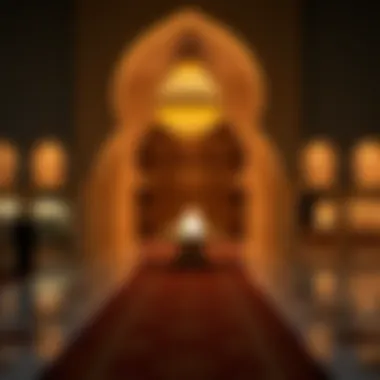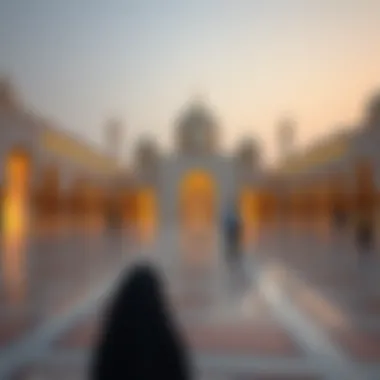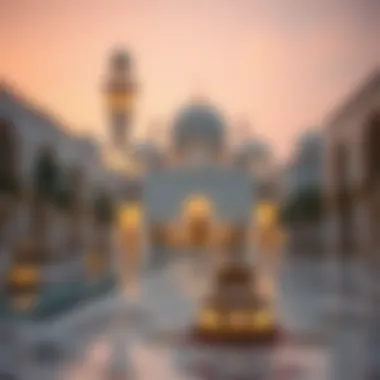Exploring Ramadan 2023 in the UAE: Culture and Society


Intro
Ramadan is a month that holds deep significance within the Islamic faith, transforming not just the spiritual landscape but also the social and economic fabric of communities. In the vibrant city of Dubai, the culture surrounding Ramadan is particularly dynamic, showcasing a blend of ancient customs and modern practices. In 2023, the UAE’s embrace of Ramadan offers insights into how religious observance affects daily life and influences broader trends, including real estate. This article will dissect these interactions to paint a complete picture of Ramadan's role in the UAE's cultural and societal tableau.
Property Market Overview
During Ramadan, a noticeable shift occurs in the property market, influenced not only by the spiritual undercurrents of the holy month but also by practical considerations of investors and residents.
Current Market Trends
As the holy month approaches, the anticipation builds. Many locals and expatriates plan gatherings for Iftar, the meal breaking the fast, which sparks demand for larger living spaces. This is when the real estate market often sees a surge in family-oriented offerings. Additionally, properties situated near mosques and community centers tend to attract more interest during this season.
Key Statistics and Performance Indicators
In the current market landscape, certain key statistics emerge:
- Rental Prices: There's typically a slight increase in rental prices for properties closer to communal areas during Ramadan.
- Sales Volume: While some speculate that activity may slow, data shows a mixed picture. About 60% of transactions occur in high-demand areas.
- Investment Returns: Properties that are strategically located may yield a return around 5-8%, depending on the area.
As Ramadan progresses, it becomes crucial for potential investors and homeowners to stay informed of alterations within the property landscape.
Investment Opportunities
In the heart of Dubai, certain neighborhoods light up as golden opportunities during Ramadan. The festive community ambiance draws attention, making these areas particularly ripe for investment.
Emerging Neighborhoods for Investment
Several up-and-coming locales showcase potential for those looking to invest:
- Dubai Marina: Offers unparalleled lifestyle options, appealing heavily through its waterfront views.
- Jumeirah Village Circle: An increasingly popular choice due to affordability and community-oriented facilities.
- Al Furjan: Known for spacious family homes, tapping into a demand for community life during Ramadan.
Investing in these neighborhoods offers a clear path, especially for those looking to benefit from family gatherings and communal activities.
Buying vs. Renting: Pros and Cons
The decision between buying or renting during Ramadan can be tricky. Here are some factors to consider:
Buying Pros:
- Long-term investment potential
- Stability for families who participate in communal Iftar gatherings
Buying Cons:
- High initial costs
- Less flexibility to relocate
Renting Pros:
- Flexibility to change locations
- Less financial commitment, ideal for newcomers
Renting Cons:
- May face higher demand for longer-term rentals
- Less control over property modifications
An informed decision hinges on personal circumstances, market conditions, and community engagement during this culturally rich month.
"Investing in the right property during Ramadan can not only provide a home but also strengthen community bonds, emphasizing the shared values of generosity and togetherness that define this month."
By examining these intricacies, individuals keen on the UAE property market can navigate the ebb and flow of trends during Ramadan, ensuring that their investments align with both personal goals and cultural significance.


For further reading and statistics, consider visiting:
Understanding Ramadan
Ramadan is not just a month on the Islamic calendar; it serves as a crucial juncture in the lives of millions. In 2023, observing Ramadan means absorbing its complexities and the way it resonates within the UAE's rich cultural fabric. Understanding its significance requires more than a surface-level examination; it beckons a dive into its religious, historical, and social intricacies.
Ramadan is primarily a time for fasting, prayer, reflection, and community. Muslims around the world fast from dawn until dusk, which is not just about abstaining from food and drink, but also about purifying the soul, cultivating self-discipline, and expressing empathy for the less fortunate. In the context of the UAE, this period accentuates the principles of family, generosity, and hospitality.
Moreover, this month fosters a sense of unity among the community. Neighbors gather for iftar—the evening meal to break the fast—while charitable activities peak, signifying the importance of sharing wealth and resources. Investing time in understanding these elements can enrich one's experience, particularly for newcomers or expatriates looking to assimilate into local customs.
What is Ramadan?
Ramadan is the ninth month of the Islamic lunar calendar, a sacred time for Muslims, marking the commemoration of the Quran being revealed to Prophet Muhammad. Each year, the dates of Ramadan shift because the Islamic calendar is lunar-based. As such, Ramadan can occur in different seasons, altering the experiences of fasting based on climate conditions.
The fast starts at dawn, known as suhoor, and ends at sunset with iftar. During fasting, practitioners are encouraged to engage in prayers, read the Quran, and seek forgiveness for their sins. Through this journey, individuals often encounter moments of deep personal growth, self-reflection, and spiritual awakening.
Historical Context of Ramadan
The historical backdrop of Ramadan is deeply intertwined with Islamic traditions. The origins can be traced back to the 7th century when Muhammad received the first revelations of the Quran. It is seen not only as a period of devotion but also as a time that emphasizes the importance of faith in both personal and communal contexts.
Ramadan has evolved over centuries and has different layers of significance across various cultures. In the UAE, for example, ancient Bedouin traditions have merged with Islamic practices, cultivating a unique observance characterized by local customs. This includes communal blessings and community-centric activities that promote cohesion.
Understanding these nuances adds depth to the experience of Ramadan, offering insights into how local customs—which may include the Ghabga and Majlis gatherings—are closely tied to the overarching themes of the month. In this way, exploring both the historical and cultural aspects of Ramadan reveals a tapestry that is intricate and multi-faith influenced, reinforcing the principles of tolerance and understanding which the UAE is known for.
Ramadan in the UAE
Observing Ramadan in the UAE holds a crucial place within the cultural and spiritual landscape of this vibrant nation. For believers, it is more than just a month-long fasting period; it weaves together threads of faith, tradition, and community. This aspect is especially significant given the UAE's diverse population, where various cultures intersect during this holy month, fostering unity among residents of various backgrounds.
Participation in Ramadan’s observances is a way to engage deeply with the local customs. These traditions enrich daily life, making the month not just an obligation but an opportunity for growth, reflection, and connection. Whether through shared meals or spiritual gatherings, Ramadan fosters a sense of belonging that resonates strongly in the societal fabric.
Cultural Significance
The cultural importance of Ramadan in the UAE is manifold. Primarily, it reinforces the core values of Islam, such as patience, humility, and community service. This month serves as a reminder of the less fortunate, pushing individuals to engage in charitable activities and broaden their understanding of gratitude.
During Ramadan, social interactions tend to flourish, as people gather to break their fast, share stories, and fortify friendships. In a land known for its rapid growth and modernity, these elements offer a sense of continuity that is vital for maintaining cultural heritage.
Local Traditions
The richness of Ramadan in the UAE is reflected in its unique local traditions, which embody the spirit of the celebration. Each of these customs not only enhances the understanding of Ramadan but also enriches communal life.
Sehri and Iftar Practices
Sehri, the pre-dawn meal, is a significant aspect of Ramadan for many residents here. Families often wake early to share this meal, which fosters togetherness before the day of fasting begins. The communal aspect of sehri often includes dishes such as hummus, labneh, and sweet pastries.
Iftar, on the other hand, is a grander affair, drawing people to restaurants and public gatherings as the sun sets. Breaking fast with dates and water, swiftly followed by lavish buffets featuring local and international cuisines, demonstrates the UAE's culinary diversity. This practice broadens one’s horizon and is a beneficial choice for both locals and visitors looking to experience the rich flavors of Emirati culture.
One of the unique features of iftar in the UAE is the concept of community iftar tents that spring up across the nation, providing free meals to passersby. This not only illustrates hospitality but engenders a spirit of giving that permeates the month.
Nightly Prayers and Gatherings
At night, many congregate for Taraweeh prayers, a special prayer performed during Ramadan. Mosques become centers of spirituality and community, drawing in worshippers who engage not only in prayer but also in discussions about faith. This practice is significant for its role in strengthening the communal bond as locals pray side by side.
The unique feature of these gatherings is their inclusivity; mosques often welcome individuals from different cultural backgrounds, uniting them under a shared purpose. It is a sight to behold, with the essence of faith transcending boundaries and creating a truly communal atmosphere.
Community Events and Festivals
Beyond daily practices, Ramadan in the UAE is marked by a variety of community events and festivals. Many organizations organize charity drives, cultural performances, and art exhibitions that revolve around the themes of giving and sharing. These initiatives significantly contribute to the local economy, as businesses collaborate to provide resources and sponsorship.


The unique characteristic of these events is their ability to invite the community to celebrate together. They strengthen the bond not only within the Muslim community but also bring in diverse crowds, encouraging intercultural dialogue. Such gatherings help promote understanding and coexistence, crucial elements in the UAE's multi-ethnic landscape.
In sum, the traditions around sehri, iftar, nightly prayers, and community events are not just customs; they symbolize the ethos of Ramadan in the UAE. By observing these traditions, individuals participate in a shared experience that strengthens their spirituality and community ties, making the month a pivotal part of life in the Emirates.
Daily Life During Ramadan in the UAE
The daily rhythms of life shift significantly during Ramadan in the UAE. This sacred month is not just a time for fasting but also a moment of reflection and community bonding. It's a period wherein spiritual aspects coalesce with social engagements, shaping not only individual behaviors but also the broader societal fabric. Understanding how daily life transforms underscores Ramadan's profound impact on various sectors including work, education, and interpersonal interactions.
Impact on Work and School Schedules
In the UAE, the work and school schedules undergo a notable transformation during Ramadan. Employers often adjust working hours, allowing employees to leave earlier to prepare for the iftar meal, which breaks the fast. Typically, the working day might be condensed down to six hours, starting later in the morning. This change is essential for accommodating the fasting routine, ensuring that employees maintain their productivity without compromising their spiritual commitments.
For schools, similar adjustments take place. Classes often begin a bit later in the day and are shorter, allowing students to focus better while dealing with fasting. Not only do these adaptations make the experience more bearable for fasting students, but they also imbue the educational environment with an understanding and respect for the cultural practices of the student body.
"Adjustments to work and school are not merely schedules; they represent an acknowledgment of cultural values and a commitment to community well-being."
Dining Etiquette
Dining etiquette during Ramadan is significantly influenced by the communal aspect of breaking fast together. Iftar, the evening meal, brings families and friends together, which highlights the importance of socializing during this period. When it comes to dining, there are several unspoken rules that many follow:
- Respect for Fasting: Non-Muslims and Muslims alike are encouraged to be discreet about eating or drinking in public during the fasting hours.
- Sharing Food: It is common practice to share your food with neighbors and friends. This act of generosity serves to enhance community bonds.
- Preparation: Many households prepare meals that are not just filling but also nutritious. Dates and water are traditionally used to break the fast, providing a sweet kick to the system after a day of abstinence.
These practices shape the overall dining experience during Ramadan, reinforcing values of kindness and hospitality.
Social Norms and Interactions
Social interactions during Ramadan are steeped in a deep sense of camaraderie. The month often inspires goodwill, with people reaching out to family and friends more than usual. Greetings such as "Ramadan Mubarak" or "Ramadan Kareem" become commonplace, fostering a spirit of warmth. It’s a time for community events including charity drives and gatherings, which serve to unite people across different backgrounds.
Additionally, there is a noticeable increase in communal prayers at mosques. The night prayers, known as Taraweeh, draw large crowds, becoming a communal event that bolsters social ties.
The essence of Ramadan is captured in these interactions; it is as much about the spiritual journey as it is about strengthening the social fabric.
Understanding these nuances of daily life during Ramadan sheds light on the cultural and societal transformations that occur, facilitating deeper connections within the community and enabling a more harmonious co-existence.
Economic Aspects of Ramadan
Ramadan significantly influences various economic sectors in the UAE, particularly retail and hospitality, making it a pivotal focus within this discussion. The period not only drives consumer behavior but also shapes societal interactions, creating a buzz that stretches beyond mere consumption. Understanding these economic aspects can offer insights into investment opportunities and market dynamics during this time. In essence, recognizing the economic reverberations of Ramadan is crucial for investors, homebuyers, and market analysts alike, as it reflects the broader cultural and societal implications of this sacred month.
Impact on Retail and Hospitality
The retail and hospitality sectors in the UAE experience marked fluctuations during Ramadan. As people shift their focus toward family gatherings and community events, there emerges a surge in demand for food, hospitality services, and luxury goods. Retailers capitalize on this disposition by rolling out special promotions and iftar packages, drawing in customers eager to celebrate the end of fasting.
- Iftar Promotions: Many restaurants and hotels offer lavish iftar buffets featuring a variety of traditional and contemporary dishes. Such promotions not only cater to the local crowd but also attract tourists looking to experience the cultural richness of the season.
- Night Markets: Cities like Dubai and Abu Dhabi often host night markets during Ramadan. These markets provide a platform for local artisans and food vendors, simultaneously reviving cultural traditions and supporting small businesses.
The overall increase in foot traffic and spending during this period is palpable, making it a lucrative time for entrepreneurs. Investors should keep a keen eye on these trends as Ramadan presents unique market opportunities that can yield significant returns.
Charitable Endeavors
Ramadan is fundamentally about giving and helping those in need. Charitable endeavors take center stage during this month, driving home the importance of compassion and community support. Many organizations engage in extensive charitable campaigns, aiming to provide for the less fortunate, which remarkably shapes both social norms and economic conditions.
Zakat and Donations
Zakat, one of the five pillars of Islam, is often highlighted during Ramadan as a time for increased giving. This form of almsgiving is mandatory for Muslims and serves as a spiritual pillar that reinforces the importance of community support. In the UAE, many individuals and corporations utilize this season to fulfill their zakat obligations.
- Impact on the Community: Zakat serves not just as a charity but as a redistribution mechanism. The funds collected help cater to a broad range of needs — feeding the hungry, supporting education, and even providing medical assistance to those who cannot afford it.
- Popularity of Projects: Several local charities and organizations take the lead during Ramadan, making contributions easy and accessible. Projects like food packages for iftar, support for orphanages, or healthcare initiatives gain tremendous visibility, often fueled by communal spirit.
This characteristic of zakat not only highlights its significance but also promotes the values of sustainability and community engagement, which are essential to the social fabric of the UAE.
Community Support Initiatives
Community support initiatives tend to flourish during Ramadan, driven by both private and public sectors. These initiatives often foster collective responsibility and encourage citizen engagement in addressing societal issues. Organizations propose various programs that reach out to the needy, focus on education, or promote women's empowerment.
- Local Organizations: Many charities emerge, tailoring their programs to collect both financial and in-kind donations to support less fortunate neighborhoods.
- Advantages of Such Initiatives: These programs often enjoy robust public participation. Being heavily promoted on social media and other platforms, they encourage not just monetary donations but also active involvement within communities through volunteering.
The unique aspect of community support initiatives is their dual impact; they not only assist those in need but also strengthen social ties amongst residents, fostering a spirit of unity and compassion essential to the ethos of Ramadan. Thus, they prove beneficial to both society and those who participate.


Overall, in examining the economic aspects of Ramadan, we see a landscape enriched by communal engagement and a spirited market, revealing deeper layers that resonate with the core values of the UAE.
Ramadan and the Real Estate Market
Ramadan represents a unique intersection of culture, spirituality, and economics in the UAE, particularly regarding its influence on the real estate market. This period brings a heightened sense of community and family togetherness, impacting various sectors, especially the housing and rental markets. Investors and homeowners alike should pay heed to the nuances that Ramadan brings, as these factors can enhance investment strategies and decision-making processes. Understanding the repercussions of Ramadan on real estate is critical for those aiming to navigate this dynamic landscape effectively.
Investment Opportunities
Ramadan creates fertile ground for real estate investment, with numerous opportunities arising through community-centered developments and events. The essence of the month encourages people to come together, making areas that host communal activities more desirable. Investors keen on exploring properties in these regions may find themselves sitting on hidden gold mines.
The hospitality sector, particularly short-term rentals and accommodations tailored for family gatherings or festive events, thrive during this period. This development enhances property values in these locales. Investors can capitalize on properties near mosques or community centers, assuring a steady stream of tenants during this lunar month.
Influence of Ramadan on Property Rentals
Demand Fluctuations
During Ramadan, demand for rentals tends to experience notable fluctuations. This occurs as families seek larger accommodations to host relatives and friends, resulting in an increased interest in properties with ample space. Key characteristics of these fluctuations include mobility trends where renters frequently upgrade their living situations. The impact can yield higher rental rates, allowing landlords to benefit financially by aligning pricing with demand spikes.
Furthermore, the ramifications of these changes can also highlight the importance of flexibility in rental agreements. Understanding that extra demand can mean higher prices and short-lived leases will help property owners strategize on how to approach potential tenants. This change contributes significantly to the broader narrative of Ramadan's influence over the region's housing landscape.
Short-term Rentals for Special Events
The popularity of short-term rentals for special events also skyrockets during Ramadan. Many families opt for these arrangements to accommodate gatherings for Iftar, the meal breaking the fast, or for Eid celebrations at the month's end. This market trend demonstrates that property owners with adequate foresight can turn their spaces into income streams, especially around festive periods.
The unique feature of this rental strategy is that it allows for , attracting transient guests and families needing temporary homes. With a knack for marketing and a competitive pricing strategy, these property owners enjoy substantial financial benefits during this festive period.
However, while there are notable advantages, such arrangements may result in challenges, such as increased wear and tear on properties. Landlords need to be ready for a probationary period in which they will have to ascertain how to maintain their properties amidst higher occupancy rates.
"Understanding the housing dynamics during Ramadan is critical for property owners and investors, as it could mean the difference between profit and loss.”
By keeping a close eye on these aspects, stakeholders can navigate Ramadan’s market intricacies and foster a more sustainable approach to real estate business during this culturally rich month. The careful consideration of community needs and market trends will enable investors and homeowners in the UAE to engage effectively with the diverse challenges and opportunities presented by Ramadan.
Celebrating Eid al-Fitr
Eid al-Fitr marks the end of Ramadan and is a time of immense joy and reflection for Muslims worldwide. In the UAE, this festival takes on a unique flavor, woven deeply into the social fabric of the nation. Understanding the importance of Eid is pivotal to appreciating its cultural and societal implications. This occasion serves not just as a celebration, but also as a reinforcement of community ties and spiritual renewal following a month of fasting and worship.
Eid Traditions in the UAE
Eid traditions vary across the globe, yet in the UAE, they exhibit a fascinating blend of ancient customs and contemporary practices.
Families begin the day with a special prayer at mosques or community centers. This collective act nurtures a sense of belonging, connecting people not just in faith, but in joyous celebration. Following the prayers, it is customary to share food, with a focus on sweet dishes and traditional dishes like Majboos. The emphasis on sharing symbolizes the gratitude for the blessings received during the month of Ramadan and underpins the core values of generosity and charity that are central to Eid festivities.
Festive Activities
Festive activities during Eid al-Fitr in the UAE encompass a range of community-oriented events that illustrate the core values of celebration and togetherness.
Community Gatherings
Community gatherings are the heartbeat of Eid celebrations. Neighborhoods come alive with people visiting one another, exchanging heartfelt wishes and sharing meals that honor the spirit of hospitality. These gatherings often feature a vibrant atmosphere filled with laughter and warmth. One key characteristic of these gatherings is the openness; it’s common to see families inviting not only friends but also acquaintances and sometimes even strangers.
What makes these gatherings particularly popular is that they represent a platform where social barriers dissolve. They invite everyone to participate, promoting inclusiveness and ensuring that no one feels lonely during this festive period. A unique feature of these events is the Eid carnival organized in various communities, showcasing local arts, crafts, and traditional music, which add a vivid touch to the overall experience.
While community gatherings have their advantages, such as fostering social cohesion and enhancing a sense of belonging, there's also the challenge of accommodating diverse preferences and dietary restrictions. Nevertheless, the essence of these gatherings remains rooted in fostering connections and reinforcing relationships among residents.
Eid Gifts and Feasting
Eid gifts and feasting are integral components of the celebration. Exchanging gifts embodies a deep-seated cultural tradition that symbolizes love, respect, and appreciation among family and friends. Cash gifts, known as Eidia, are particularly common, especially for children, offering them a chance to partake in the joy of Eid.
The key characteristic that makes Eid feasting a focal point is its vast array of dishes that reflect both traditional and modern influences. Families often prepare mouth-watering dishes that vary in complexity but are always abundant. While feasting on delicacies is a time-honored practice, the communal aspect of sharing food unites families, friends, and communities, reinforcing bonds that can sometimes be overlooked in day-to-day life.
A unique feature of Eid feasting is the elaborate spreads arranged by families, showcasing both culinary skills and the intention to welcome guests. However, one drawback can be the pressure to maintain the high standards of hospitality expected, which might put undue stress on some families. Yet more often than not, the joy of preparing and sharing these meals overshadows any of the associated pressures.
"Eid al-Fitr not only marks the end of fasting but also symbolizes a renewed commitment to family and community bonds."
In summary, celebrating Eid al-Fitr in the UAE encapsulates much more than a festive gathering. It represents an affirmation of identity, cultural heritage and the importance of social connection in a rapidly changing world.







